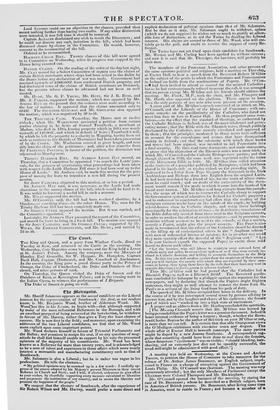The members of the Protestant Association, and other persons of
the same opinions political and religious, held a meeting on Thursday, at Exeter Hall, to hear a speech from the Reverend Robert M'Ghee on the subject of the perils to which the Protestants and Protestantism in Ireland are liable from the machinations of Popery. Mr. O'Con- nell had been invited to attend as counsel for the accused Catholics ; but as lie had contemptuously refused to accept the call, it was arranged that no person except Mr. APGliee and his friends should address the meeting. Mr. Finch, M.P., took the chair, and Alr. Pluinptre and Mr. Hardy also appeared on the platform. These appear to have been the only persons of any note who were present on the occasion.
A great part of Mr. Al' Ghee's speech consisted of an attack on Mr. O'Connell, and the Liberals of the House of Commons ; with sar- castic remarks on the pusillanimity of the Catholics, who dared not meet him face to face in Exeter Hall. He then proposed some reso- lutions,—to the effect that the standard of theology, as authorized by the Catholic Bishops in Ireland, was of the most intolerant and perse- cuting nature ; that the Bible with the Ithemish notes, though publicly disclaimed by the Catholics, was secretly circulated and approved of by them ; that the principles inculcated in those notes were sufficient to account for the convulsions and crimes that have disorganized society in Ireland ; end that the solemnity with which these books and tenets had been abjured, was intended to lull Protestants into a fatal security. Ile then read some documents, and made statements, to prove dint the abjuration of the Rhenish 'totes was a mere trick, to which Mr. O'Connell and the Catholic Bishops were parties; and that though abjured in 1816, the same work was reprinted under the name of the Alacilamara Bible in 1818. SIr. Al•Glice then called attention to the contents of a pamphlet published by Rivingtons, svhich had been placed in his hands 0111:,' at twelve o'clock on the preceding night. It professed to be a letter from Pope Gregory the Sixteenth to the Irish Archbishops and Bishops done into English from the original Latin. It had been translated by a friend of his, for the truth of whose state- ment he could vouch ; and no doubt of the authenticity of the docu- ment would remain if the mode in which it came into the hands of his friend were known. Mr. 31' Ghee read long extracts from this pamph- let; the scope of which was to instruct the Catholic clergy to support theGoverninent system of education for Ireland for Catholic purposes ; and to endeavour to counteract any bad effect that the reading of the Scripture extracts might have on the minds of the pupils, by building school-houses close to Catholic chapels, and using those buildings occasionally for the celebration of mass—by distributing translations of the Bible differendy warded from those used in the Scripture extracts, in order to weaken the effect of unaided Scripture—and by procuring ca- techisms without answers to be used in the schools, so that a master, secretly a Papist, might give the proper answers. The Pope is also made to recommend that the efforts of the Catholics should be directed to the filming up of ecclesiastical offices in the " Anglican schism '• with men of unbounded licence of opinion; for in no other way could they more speedily effect the downfal of the " Anglican sect." " Let it be your business (quoth the supposed Pope) to excite these wild beasts to devour each other.
"Let the heretics, who still labour to maintain some outman] form of Catholic unity and order, be everywhere spoken of as if they were secretly in- clined to Catholic doctrine, and willing to reconcile themselves to the Holy See. In this way you will awaken against them the suspicions of their nation; and you will increase the enmity with which they are regarded by their asso- ciates in heresy, thus tying these foxes by the tails that their faces may tend its opposite directions (idfacies corum in adverse tendant). Thus Mr. 1-i‘Glice said he had proved that the Catholics had a
Rhemish Pops t; .w).11 as a Ithernish Bible. The Reverend gentle- man concluded his hafringue by a philippic against the reporters for the newspapers, and by declaring that though the Papists might frighten statesmen, they might as well attempt to remove the dome from St. Paul's as a servant of the living God from his path of duty.
The speech of Mr. M'Ghee occupied four hours in the delivery. le the course of it he was interrupted several times by persons offering to answer him, and by the laughter and cheers of his audience ; the female part of which was "worked up into a high state of excitement."
A prayer and an address from a Air. Harding concluded the spectacle. [The 111o, rainy Chronicle asserts that Mr. M'Ghee was hoaxed by being persuaded that the Pope's letter was a genuine document. Indeed it bears internal evidence of being a forgery; though, whether the Reve- rendCharles Boyton be the author of this trick on poor M'Ghee or not, is more than we can tell. It is certain that that able Orangeman views the O'Mulligan exhibitions with extrusive scorn and disgust. The whole affair at Exeter Hall is beneath contempt. The same parties might be duped by a new Joanna Southcote. A correspondent sug- gests that something should have been done to cool down the females, whose dangerous " excitement " was so visible : "should bleeding, hair- shaving, and an extremely low diet not be speedily successful, the tread-mill might be administered with good effect."]


























 Previous page
Previous page